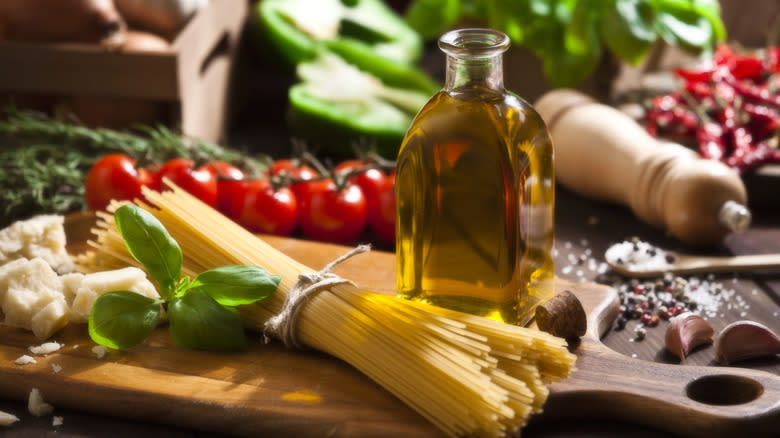What Oil Does Olive Garden Use For Its Fryers?

From main courses like crispy fried mozzarella to its famous breadsticks, just about everything that Olive Garden offers includes a touch of cooking oil, not just the fried menu items. The vast majority of people have no reason to worry about the exact type of oil used in their food when they sit down at a restaurant. After all, what's the big deal over a dash of canola or olive oil? However, for some, the choice of oil matters a lot.
Most cooking oils are plant- or nut-based, such as peanut, soy, and canola. This categorizes them under the FDA's "Big 9" group of the leading causes of allergies: milk, eggs, fish, shellfish, tree nuts, peanuts, wheat, soybeans, and sesame. For people with food sensitivities, the type of oil used can have direct consequences on their health. Others, following certain diets like the Mediterranean diet, may also want to know the exact type of fat they're consuming.
And despite what the name may suggest, when you dine at Olive Garden, know that most dishes, especially those made in their fryers, are prepared using highly refined canola and soy cooking oils. But don't panic just yet if you're allergic to either! Because they are highly refined, they could actually be pretty safe for you to eat.
Read more: The 20 Best Olive Oils For Cooking
Highly Refined Canola And Soy Oils Are Quite Safe

There are two types of cooking oil available today: refined and unrefined (also called "virgin oil"), the latter of which can taste and smell pretty funky. Besides natural flavors from the plant or nut, they may also contain pesticides and other contaminants — all of which you probably don't want in your body. That's why cooking oils usually go through refinement to improve their flavor and odor, as well as to give them some additional characteristics like a higher smoke point (for frying), or better shelf stability.
Once the raw oil has been refined, it loses quite a lot of its chemical content, such as soluble vitamins and antioxidants. A lot of natural proteins are taken out as well. This isn't necessarily a bad thing, especially if you're allergic: among those removed proteins are the ones responsible for triggering allergies, according to the journal Food and Chemical Toxicology.
Because of this, the highly refined canola and soy oils used by Olive Garden are generally safe for consumption. Most people with allergies won't present any symptoms at all, while especially sensitive individuals may just experience mild symptoms. However, that still doesn't mean you should consume the oil without caution. It's still a good idea to inform your server about your allergy when you arrive, just to be safe! If possible, they'll swap it out with something that won't trigger your allergy at all, rather than risking it, however small the chance.
Read the original article on Tasting Table

